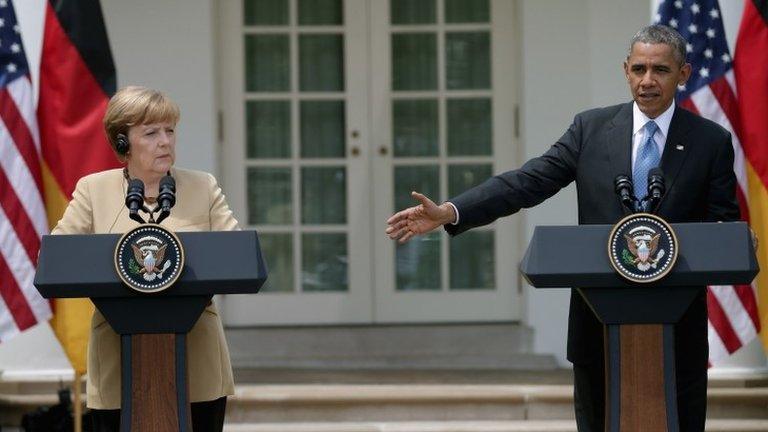John Kerry tells fugitive Edward Snowden to 'man up'
- Published
John Kerry: "This is a man who has betrayed his country"
US Secretary of State John Kerry has labelled intelligence leaker Edward Snowden a fugitive from justice who should "man up" and return home.
Mr Kerry added that if Mr Snowden, 30, "believes in America, he should trust the American system of justice".
His comments come in the wake of an interview with NBC , externalin which Mr Snowden said he sought asylum in Russia because the US revoked his passport.
Mr Snowden also described himself as a trained spy, not a low-level analyst.
"A patriot would not run away," Mr Kerry said on Wednesday. "If Mr Snowden wants to come back to the United States... we'll have him on a flight today."
Mr Kerry also called the former National Security Agency contractor "confused", adding "this is a man who has done great damage to his country".
"He should man up and come back to the US," Mr Kerry said.
Harvesting data
In the NBC interview, Mr Snowden claims he was trained as a spy who worked undercover overseas for the CIA and NSA.


Edward Snowden's revelations
Scandal breaks in June 2013 when Guardian newspaper reports that US National Security Agency (NSA) collected telephone records of tens of millions of Americans
Scandal widens amid reports that UK spy agency tapped fibre-optic cables that carry global communications and shared vast amounts of data with NSA
Mr Snowden flees to Hong Kong, says NSA led more than 61,000 hacking operations worldwide, including in Hong Kong and China
Flies to Moscow on 23 June 2013. Claims subsequently emerge that NSA spied on EU offices in US and Europe, monitored phones of 35 world leaders and bugged various European allies

But he described himself as a technical expert who did not recruit agents.
"What I do is I put systems to work for the US," he said. "And I've done that at all levels from the bottom on the ground all the way to the top. Now, the government might deny these things, they might frame it in certain ways and say, 'Oh well, you know, he's - he's a low-level analyst.'"
When Mr Snowden fled the US in May 2013, he had been working as a technician for Booz Allen, a giant government contractor for the NSA.
Last year, he fed a trove of secret NSA documents to news outlets including the Washington Post and the Guardian.
Among other things, the leaks detailed the NSA's practice of harvesting data on millions of telephone calls made in the US and around the world, and revealed the agency had snooped on foreign leaders.
The revelations have sparked a debate in the US over the appropriate role of the NSA and the extent to which it should be authorised to conduct such broad surveillance.
President Barack Obama has asked Congress to rein in the programme by barring the NSA from storing phone call data on its own and to require it to seek a court order to access telecom companies' records.
Last week, the US House passed such legislation, sending it to the US Senate.
- Published27 May 2014

- Published2 May 2014

- Published1 November 2013

- Published23 May 2014

- Published17 January 2014

- Published16 December 2013
